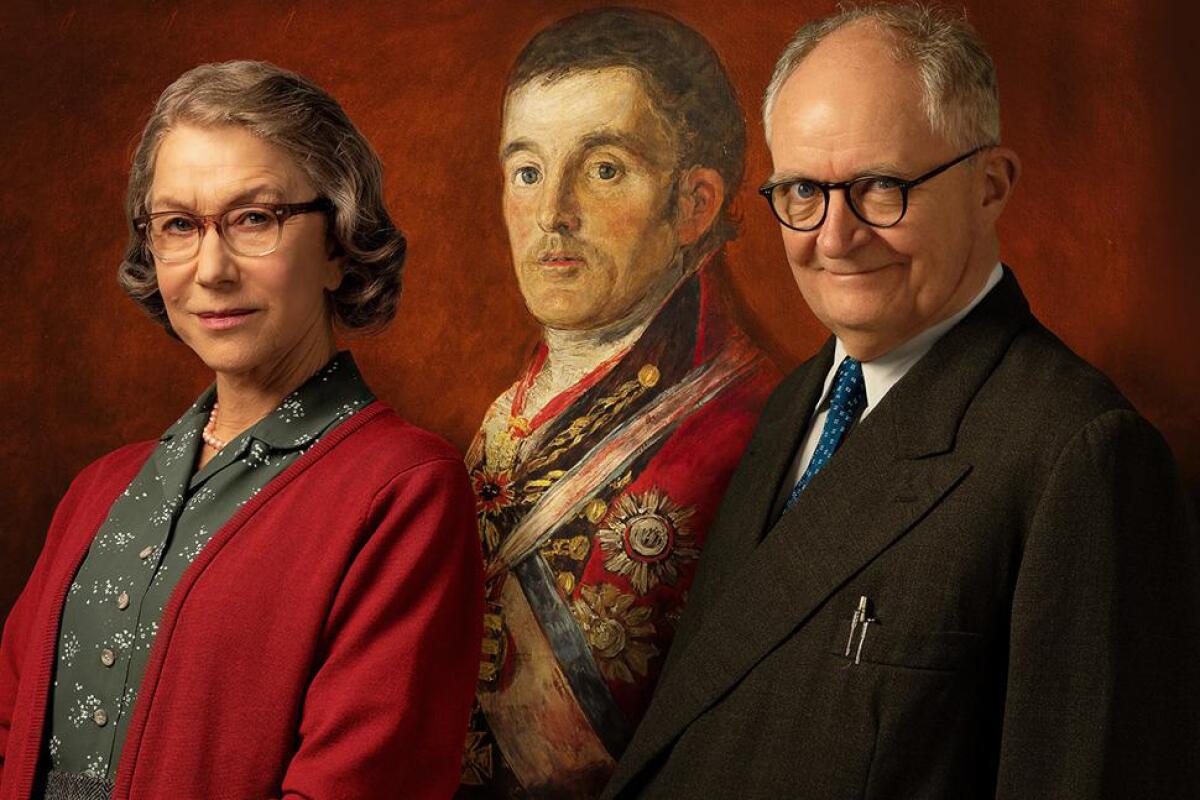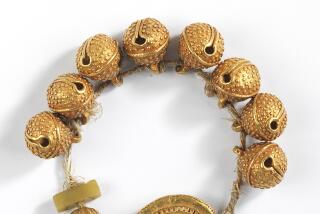Review: Broadbent, Mirren steal the show in Roger Michell’s last feature ‘The Duke’

- Share via
The Times is committed to reviewing theatrical film releases during the COVID-19 pandemic. Because moviegoing carries risks during this time, we remind readers to follow health and safety guidelines as outlined by the Centers for Disease Control and Prevention and local health officials.
Don’t get too excited, John Wayne fans. “The Duke” has nothing to do with your favorite western movie star. It is, however, a lively and engaging account of the unusual 1961 theft of Francisco Goya’s portrait of the Duke of Wellington from London’s National Gallery and the eccentric do-gooder at the center of it all.
It’s also notable as the last narrative feature directed by Roger Michell of “Notting Hill” fame, who died in September at 65.
The great British actor Jim Broadbent (“Topsy-Turvy,” Iris,” “The Iron Lady”) enjoys one of his best roles as Kempton Bunton, a 60-year-old Newcastle cabdriver and wannabe playwright with a fierce independent streak. He also has a dubious set of ethics, at least when it comes to fighting — or, as the case may be, evading — the system.
His ongoing cause célèbre is the license fee the BBC collects to watch its programming. “Free TV for the OAP” (old age pensioners) screams Bunton’s protest placards, which attract the local press and several officials but anger his long-suffering wife. Dorothy (Helen Mirren, also terrific) is a humble housecleaner fed up with her husband’s social consciousness — and the mortifying attention it receives. Confirming her worst fears, Bunton ends up spending 13 days in a nearby prison for standing on principle and refusing to pay the TV tax.
The film kicks into higher gear when Britain makes a big deal of its purchase of the Goya painting for 140,000 pounds (equivalent to about $4.3 million today). The move infuriates Bunton, who thinks the money would be better spent offering free TV to the nation’s pensioners. Yeah, he’s pretty obsessed.
A series of turns leads Bunton, during an ill-conceived trip to London to make his case against the BBC license fee to Parliament and the media, to purloin the Wellington portrait from the National Gallery. That we don’t exactly see the execution of the theft or how Bunton smuggles the painting back to Newcastle may feel jarring, especially given the enormity of the deed, but it’s part of an effective twist. Meanwhile, Bunton sends an anonymous ransom note to the press that helps grease the wheels of the police investigation.
The film’s third act finds Bunton on trial for the theft, which allows Broadbent further opportunity for enjoyable cheek and charm as his character, who’s being defended by twinkly lawyer Jeremy Hutchinson (Matthew Goode), reconfirms his love of community, a lifelong desire to help others, and plans to donate the spoils of the pilfered picture to needy retirees. But will the jury buy it?
Michell, working off a jaunty script by Richard Bean and Clive Coleman, keeps the action bubbling along with little room to ponder the stranger-than-fiction improbability of the steal, one that, with the plethora of security measures and protocols in place nowadays, feels quaint — though in a fun, nostalgic way.
But there’s more at work than just a caper. It’s also the story of a marriage that’s been near-irrevocably damaged by the loss of a child.
Dorothy’s impatience and crankiness with her husband, as well as a seemingly palpable disdain for him, at first seem rooted in his pie-in-the-sky crusades, flighty job choices and how they barely scrape by financially. But as the tale unfolds we learn how, at a certain level, she blames Bunton for the death 13 years earlier and, as a result, refuses to talk to him about their child despite Bunton’s pleas for her to do so.
This thread gives the picture a heartfelt, kitchen-sink gravity. And Mirren is positively transformative, down to the smallest details, as the dowdy, grieving, working-class Dorothy. (It should be said that Broadbent and Mirren are playing younger than their actual ages but pull it off.)
Fionn Whitehead (“Dunkirk,” “Voyagers”) is also winning as the Buntons’ devoted, boatbuilder son, Jackie. The supporting cast is fine, as well: Jack Bandeira as dodgy older son, Kenny; Charlotte Spencer as Kenny’s devious girlfriend, Pammy; and Anna Maxwell Martin as Dorothy’s empathetic employer, Mrs. Gowling. And so are the film’s visual palette, period re-creation and sprightly score.
'The Duke'
Rated: R, for language and brief sexuality.
Running time: 1 hour, 36 minutes
Playing: Opens Dec. 10 at Laemmle Royal Theatre, West Los Angeles
More to Read
Only good movies
Get the Indie Focus newsletter, Mark Olsen's weekly guide to the world of cinema.
You may occasionally receive promotional content from the Los Angeles Times.










